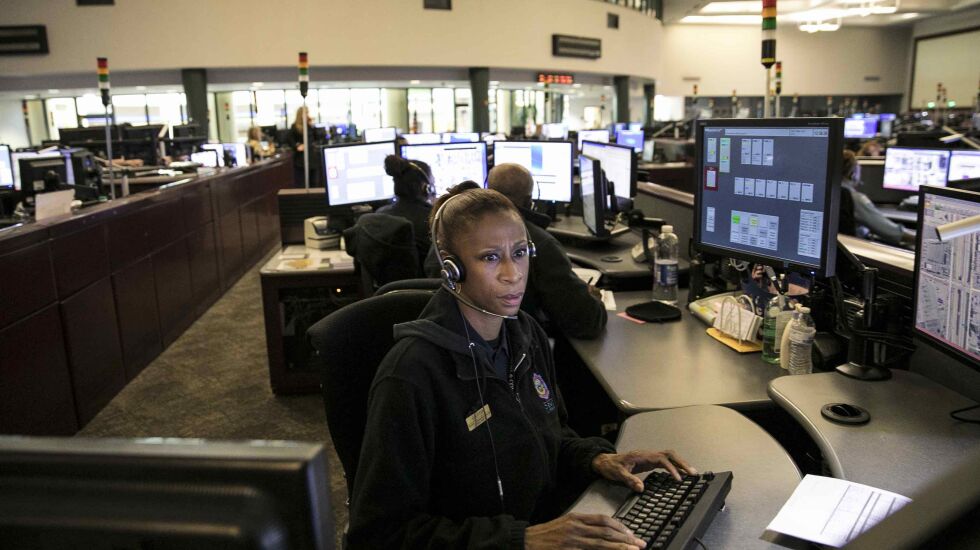
To handle Chicago’s roughly 175 behavioral health-related 911 calls each day, the city relies almost entirely on the police — an approach that can lead to jail detentions, unnecessary hospitalizations and violent police confrontations.
A pilot program under Mayor Lori Lightfoot aims to curb the police role. The program, Crisis Assistance Response and Engagement, is setting up mobile teams that include paramedics, mental health clinicians and, in some cases, cops trained in crisis response. The teams aim to deescalate crises and connect people to the care they need. Since the program’s September 2021 launch, CARE responses have not included any arrests or uses of force.
The program expanded to three full-time teams last summer. But those teams together have averaged fewer than two 911 responses per day, according to city data.
City officials blame those numbers on initial 911 protocols for CARE — rules established by Illinois public health regulators to ensure the teams would be safe and prepared for the situations they’re walking into. Those protocols have limited the teams to calls with minimal safety risks. But the city says the protocols, starting next month, are going to loosen up.
“We actually have approval … to go on calls where people are yelling, screaming, pacing,” said Matt Richards, a deputy public health commissioner.
Richards said the change will allow teams to handle calls that are ripe for a mental health intervention.
“If somebody is yelling, screaming or otherwise dysregulated — that’s actually exactly what [CARE teams] exist to work with,” he said.
When the pilot launched, dispatchers could send CARE teams only to calls labeled as “mental health disturbances.” That left the traditional police-only response for suicide threats, well-being checks and trespassing, an issue in which mental health often plays a role, because people with mental illness who are unhoused sometimes try to find shelter in doorways or abandoned buildings. Those calls will now be eligible for a CARE response.
Chicago Public Health Commissioner Allison Arwady said the first year and a half of CARE operations has demonstrated the program’s safety and professionalism.
“I do think we feel more well-positioned to be a little bit more proactive about going on calls where there’s greater uncertainty,” Arwady said.
Anders Lindall, a spokesperson for AFSCME Council 31, the union for the city’s public health employees, voiced no alarm about their safety under the new 911 rules and celebrated the change: “These are the types of calls that can often get the hairiest with police, with the most potential for escalation. Mental health workers will be able to deescalate for better outcomes.”
City officials do not know how many calls will be dispatched to CARE teams under the new 911 rules. The teams will remain ineligible for any scene known to involve a weapon. And teams can be sent to calls with kicking, spitting or hitting, but only under limited circumstances and if the team includes a police officer.
Still, Richards said he expects the number of qualifying calls to greatly expand — and that will require more staffing. Currently the city’s health department has six staff members on CARE teams.
“My big focus is literally doubling the size,” Richards said.
Arwady said the position requires specialized skills, and the hiring is not easy: “We’re posting, and we’re not — we might not always get candidates.”
While mental health activists, police officers and city officials all largely agree the city needs more ways to respond to mental health crises than sending police, there have been disagreements about how CARE should operate.
Treatment Not Trauma, a campaign led by some Chicago mental health professionals and advocates, is asking the city to remove police officers from the program. They argue the presence of armed cops can escalate tension and lead to violence, even fatalities.
A study by the Virginia-based Treatment Advocacy Center found “people with untreated mental illness are 16 times more likely to be killed during a police encounter than other civilians.”
But public health officials argue that having police on some teams allows CARE to respond to a broader range of calls.
As Chicago expands its mobile teams, public health officials and advocates are pointing to a shortage of destinations to take people for services.
Lindall, the union spokesperson, said CARE teams encounter long waiting lists when trying to connect people to immediate help.
“Currently, if someone needs services urgently, or things like a medication refill, their only choice is to take them to an ER if they can’t find an immediate opening,” he said.
Treatment Not Trauma is trying to persuade the city to reopen mental health clinics that Mayor Rahm Emanuel’s administration closed in 2012. Most of Chicago’s mayoral candidates say they would do that if elected. But Lightfoot has argued that reopening the clinics would not be the best use of limited mental health resources.
Arwady said the city is looking to buy a hotel where crisis teams can take people who need both shelter and mental health support. Her department is also hoping to build a sobering center, where teams would take intoxicated people instead of sending them into the criminal justice system.
“The most visible part is what happens with 911, but we are … also working on alternate destinations,” Arwady said, adding that the goal is to “break the cycle” in which people need emergency services repeatedly.







